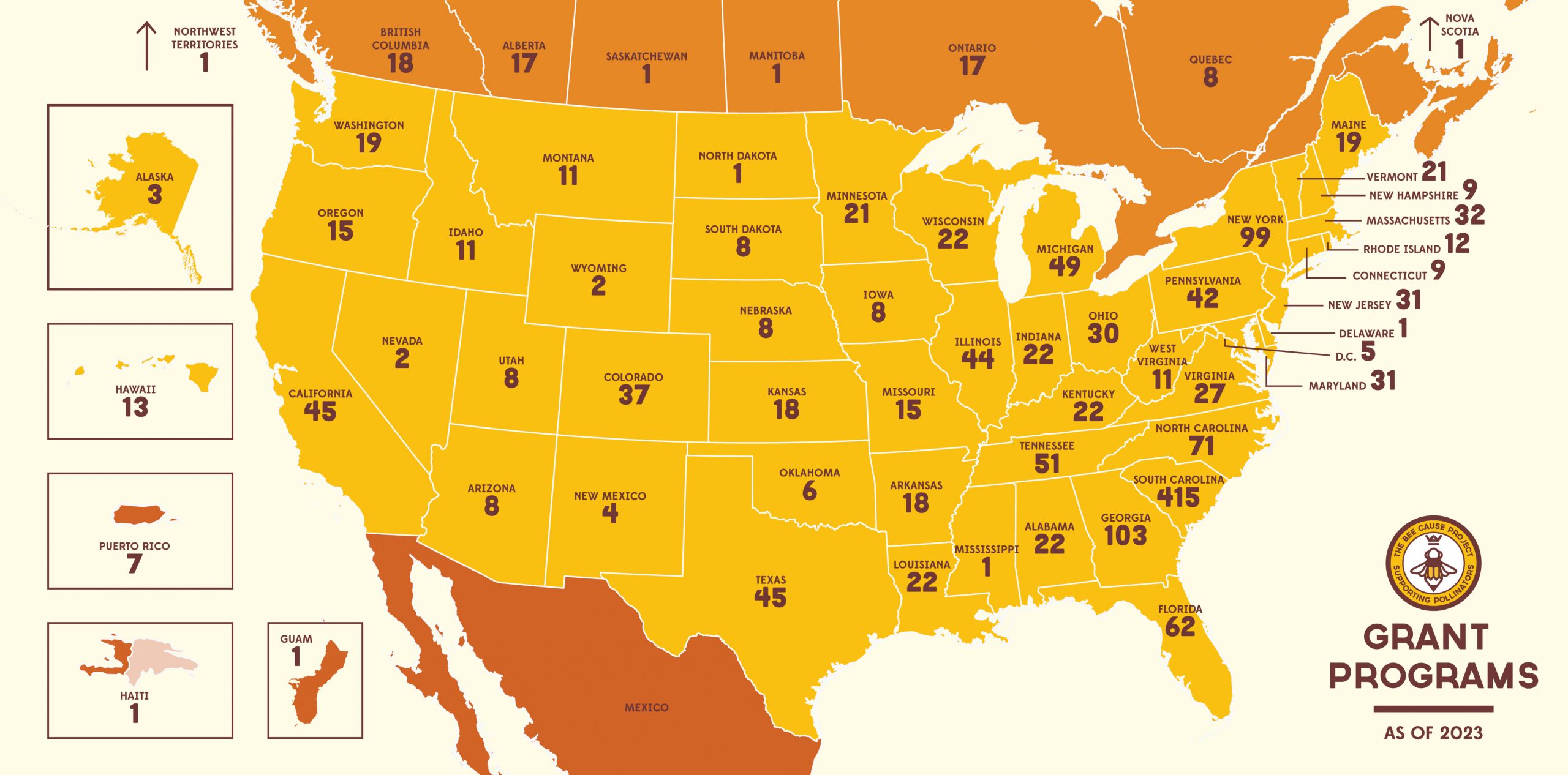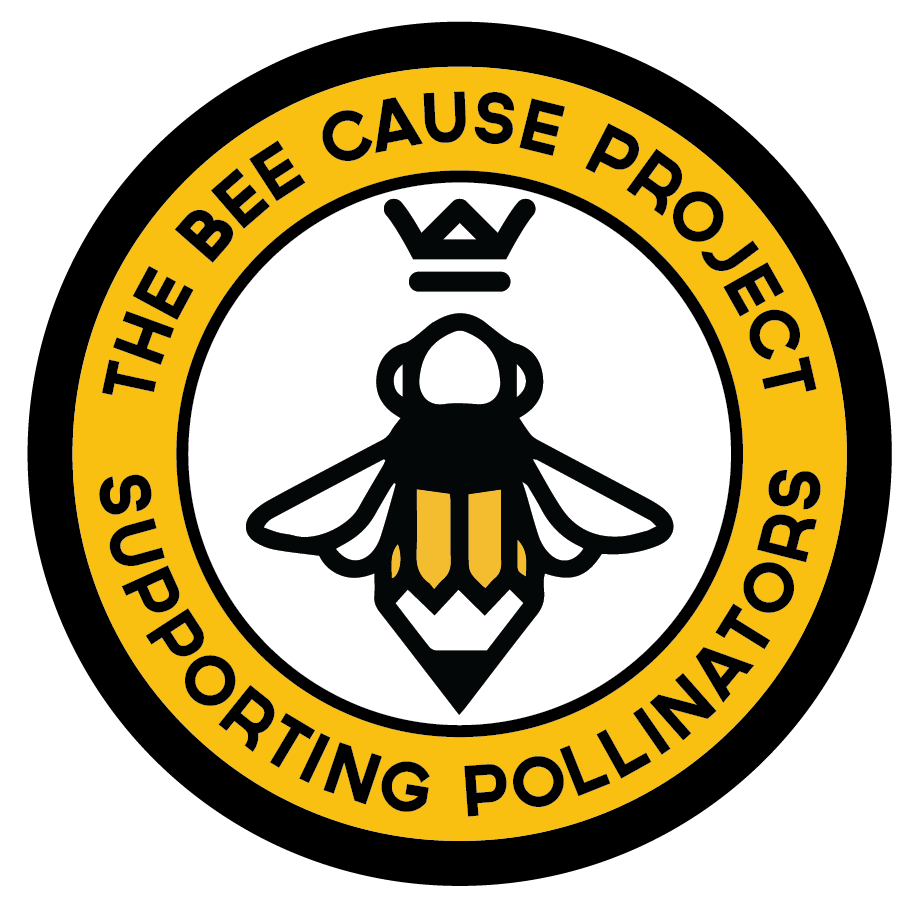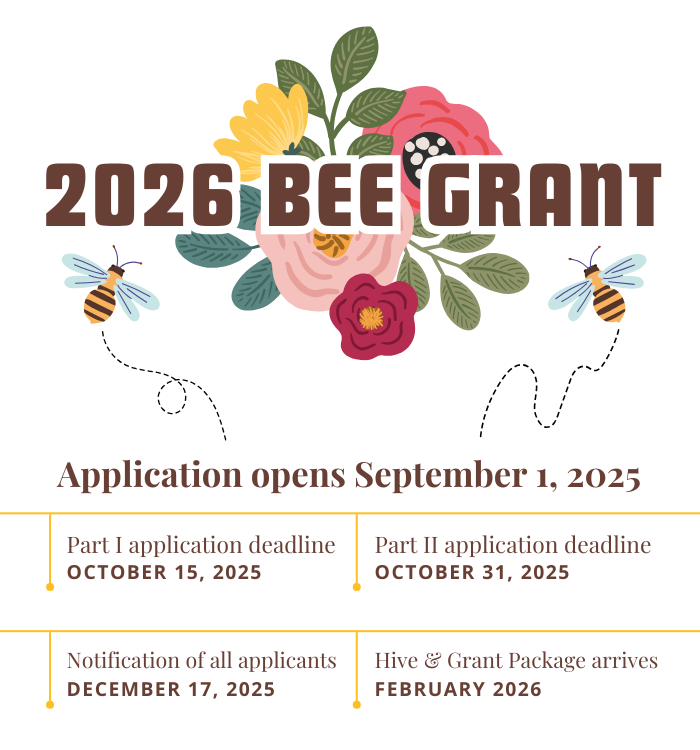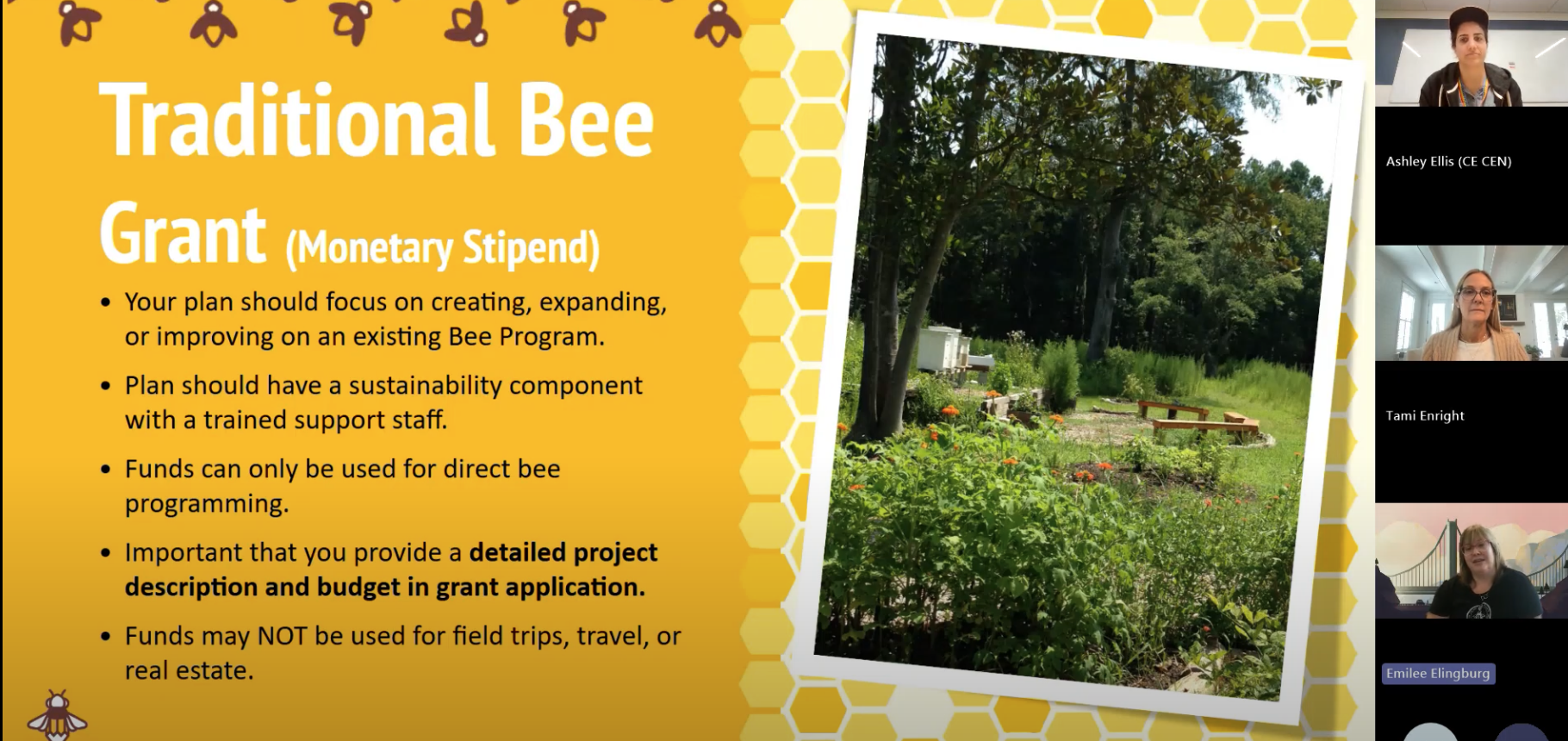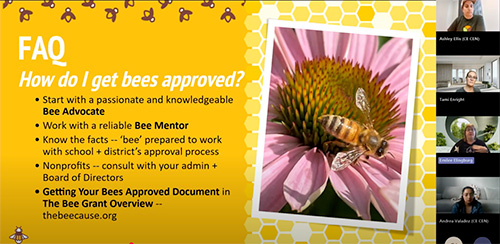Bee Grant Details
Applications for our 2026 Bee Grant are now closed.
You can qualify for the 2026 Bee Grant if you are a school or non-profit that serves at least 10 students in grades K-12 in the United States or Canada. Yes, that’s it – no further eligibility requirement is necessary!
The Bee Grant program allows for a school or non-profit organization to receive support for an educational live bee program. The purpose of this grant is to bring live bees to campuses across the country to engage students in pollinator education, enhance STEAM skills, and develop a life-time love of conservation and environmental stewardship. In addition, to live bees hives, grant recipients receive curriculums, lesson plans, and other educational materials to bring the classroom into the heart of the hive!
The Traditional Bee Grant and Renewal Grant opens every September and closes at the end of October. Our amazing partners at Whole Kids (WK) provide support for this successful program.
If you are ready to apply, you can go to the Bee Grant page on the WK website to register and complete your application. The WK website is the ONLY place to register and submit your completed application. Ready to learn more? Keep reading to find informational webinar links and sample applications for download.

2026 Bee Grant Program Description
The 2026 Bee Grant is brought to you by The Bee Cause Project + Whole Kids! Applications open for submission on September 4th. Our most successful applicants tend to begin the pollinator curriculum before welcoming live bees, so we created the digital Back to School Bee Program to keep the momentum going!
The Traditional Bee Grant has two offerings, an Indoor Observation Hive to install in your classroom OR a Monetary Stipend where you would receive funds to purchase or update your own equipment. Please download the Grant Overview below to review the details of the grant and what to expect. This document is useful to distribute and review among the administration on your campus and the community at large.
Download a PDF copy of the Traditional Bee Grant application for your preparation purposes. All final submissions must be made online.
The Renewal Bee Grant is for former grant recipients who have had a grant for at least one year before the time of application. Please download the overview to understand how the Renewal grant can bolster your current pollinator program.
Download a PDF copy of the Renewal Bee Grant application for your preparation purposes. All final submissions must be made online.
Bee Grant Application Webinars
Get started with your Bee Grant application by attending an upcoming webinar.
Bee Grant Overview Webinar
Missed it? No worries. Watch this webinar to get details on eligibility, grant costs, timelines and more.
Bee Grant Q&A Webinar
Watch this webinar to get all of your Bee Grant questions answered.
Bee Grant Application Webinars
AROUND THE HIVE
Curious about what you can look forward to in your hive? Check out local hives in action!
Examples of Indoor Observation Hive at Grant Schools.
Examples of Langstroth Hives on school campuses.
Frequently Asked Questions
What are the criteria to apply?
- Be in the US or Canada
- Be a K-12 school or a non-profit organization
- Work with at least 10+ children
- Bee Program must be used as an educational tool
More specifically, you will need an employer identification number (EIN). Examples of possible applicant organizations: private schools, a youth program, a museum, a camp, or a homeschool association with 10+ students.
Who is the applicant?
If you are the individual who is delivering the educational programming, you are the Bee Advocate and the applicant. If you are the individual who is hosting the bees, you are the Bee Advocate and the applicant. We recognize that every program is different so be sure to ask us to be sure at info@thebeecause.org.
Example:
A University Extension Agent can be a Bee Advocate and Applicant IF…as per the job description the Extension Agent is tasked with teaching pollinator education for the duration of the job, will manage the hive, and will be working with more than just 1 school within their region.
A School can be considered the Bee Advocate and Applicant IF the school is chartered to teach pollinator education every year as part of their curriculum, will manage the hive, and are the responsible party for the hive and the students interacting with the hive.
What is a Bee Advocate?
The Bee Advocate is the person on campus responsible for implementing the pollinator curriculum, ensuring students are engaged with the hive on campus, and working closely with the Bee Mentor to make sure that maintenance and management of the hive are conducted regularly.
How do I get bees approved on my campus?
This is a far-reaching question. There are many steps to the process that begin even before you apply for our Bee Grant. First, make sure you have a passionate and knowledgeable Bee Advocate. When the Bee Advocate works with a reliable Bee Mentor you can build a successful bee program. Having a solid foundation for your program in place early will make it easier to get approval from your administration. This will also bolster your application for grants to support your program.
Make sure that you know what you need, the sample application can help you get prepared. You will need your grant proposal and budget to work with your school and district approval process. Nonprofits should consult with the administration and the Board of Directors.
Refer to The Bee Grant Overview to learn how to get your bees approved.
How do I handle safety on campus?
This starts with proper signage indoors and outside. Signage comes as a part of your grant package. The placement of the beehive is key, the Bee Mentor can help with this assessment. It is important to keep the hive away from high-traffic areas. Provide a 10-foot easement for the bees to orient to the hive and make sure that the hive is output vent is not near frequently used doors. Talk to your school nurse to develop a plan for students who are stung and who are allergic.
Refer to The Bee Cause Safety Guide and share it with families and staff. For more details refer to The Bee Grant Overview.
Can a homeschool group apply for a bee grant?
Yes, homeschool associations can apply. The association must work with at least 10 students who are registered in grades K-12. This association will need an employer identification number (EIN) to apply in the SmartSimple application. Finally, the association must be registered as 501(c)3. If you have further questions regarding your association’s status in regards to the EIN or 501(c)3 status please email grants@wholekidsfoundation.org.
Can I apply if I am a University or College?
If your department is committed to providing pollinator education to a specific school that you wish to partner with or a group of schools in your area then you can apply. You must be willing to serve at least ten K-12 students per semester. We also have grant recipients such as museums or farms that serve as hosts to field trips and weekend programming for kids to interact and learn about bees. In this instance, this type of programming would be focused on having the kids come to you. You must be clear about what type of programming structure you plan to implement (traveling or in-house). Partnering with a local school may be a great way to get things rolling!
As the applicant for the grant, you are taking responsibility for the educational programming, bees, and sustainability of the program so that it becomes a permanent fixture in your organization that can be replicated year after year regardless of staff turnover.
Can I apply if I am a 4-H program?
Yes, no matter the affiliation of the 4-H program you belong to, you can apply for a Bee Grant as long as you have at least 10 students in K-12. As a 4-H program, you would apply for the grant as a non-profit organization.
What if I already have beehives on campus?
Are you a previous WKF + BCP Bee Grant Recipient? Then the Renewal Grant is the best option. The purpose of the Renewal grant is to improve your existing program by allowing you to purchase bees, bee suits, smokers, more hives, curriculum, books, pollinator gardening materials, and any other supplies that will support your bee program. Funds must be spent on direct bee programming, however, funds cannot be spent on field trips, travel, or real estate.
Review the Renewal Grant overview for clarification.
If you are not a previous recipient, you can apply for a monetary grant through the Traditional Grant.
Can this grant be used for managing Mason or Native Bees?
This grant is specific to Honey Bees. The Bee Cause DOES provide programming for other types of bees throughout the year including habitat restoration, native bee habitats, pollinator-friendly gardening projects and more.
Sign-up for our newsletter to keep up with the latest.
Can funds be used to plant a garden or create an outdoor classroom?
YES! If there is an already fully operating beehive at the location, funds can be spent on a pollinator garden or educational materials. The key is to reflect on how you plan to spend the money in your budget. This must provide a full breakdown of how the funds will be spent in the budget section of the application.
Download a sample application here.
How does the Observation Hive work?
The observation hive is an indoor installation with a hole drilled into the wall where bees can go in and out freely to forage for pollen and water. The observation hive comes with 8 frames where the bees build their hive. Bees can be observed on both sides of the hive (the hive pivots from the base).
The Bee Advocate and Bee Mentor should work together to find the proper placement. Learn more below:
Where should I put an Observation Hive?
Ideally, your hive should face south/southeast and not in direct sunlight. Make sure you install it in a part of the building where the outside wall has low traffic because the bees will be coming and going from that wall. Do not install the hive under or near a heating or air conditioning vent because bees are expert hive managers. They can manage the temperature just right, we don’t want to mess with that balance! Of course, you still want to make sure the hive is in a temperature-controlled room.
How do I find a Bee Mentor?
Start by contacting your local beekeeping association. Remember that your area may have a city, regional, AND state beekeeping association that you can utilize as a resource. Find out if a beekeeping conference is held in your area — this is a great way to find local support. You can tap your school community, a Bee Mentor can be a staff member or parent! Visit Bee Culture to determine the resources all 50 states and Canada.
There are lots of willing beekeepers willing to help!
What should I look for in a Bee Mentor?
The most important trait is a passion for education! You want a beekeeper willing to assist you on your journey. The beekeeper you choose should be trained or experienced. But know-how is what you need most. The prospective beekeeping volunteer can be a member of the local beekeeping association but it is not required. We have had plenty of hobbyist beekeepers volunteer at local schools to pass on the love of beekeeping. Although funding can pay a beekeeper this is not a sustainable model to maintain bees on your campus. A better method may be to have a beekeeper volunteer their time for basic maintenance and educational time with the students and determine if larger projects just as honey harvesting or hive pest treatment may require a monetary offset for your beekeeper.
How often does the Bee Mentor need to work with the bees?
You will need to help you install your bees, usually in the spring. When starting the hive your Bee Mentor should visit every two weeks. Once the hive is established, monthly check-ins are fine. Your Bee Mentor will need to conduct seasonal honey harvests and hive maintenance checks to treat for hive pests or mites during different times of the year.
What is Pay it Forward and how does it work?
Honey is ordered on consignment to raise money for your Bee Fund by selling The Bee Cause Project special label honey for $15 per jar. Your program will keep $5 per jar and the Bee Cause uses the additional $10 to fund another program! Order at any time throughout the year
How to handle spraying chemicals around the hives?
Ask the technician to spray early morning or late afternoon when bees are not foraging. If possible using a granular application is best, it creates less drift. Ask the technician to use an application that is non-toxic to pollinators. Make sure to close the hive entrance the night before and make sure to wait to open the hive after the sun has dried the wet application of chemicals. You can relocate bees during months when extreme spraying is done.
What is included with the Indoor Observation Hive?
Observation Hive Includes:
- Observation Hive Body – bottom entrance with a landing porch
- Deep Frames
- Mounting Components
- Feeder
- Beehive Cover
- Foam Indoor + Metal Outdoor Signage
- Educator’s Box
Do you have a sample of the application?
Who do I contact if I have issues?
Contact grants@wholekidsfoundation.org if:
- You have issues with SmartSimple (the application portal)
- You have questions about Grant Responsibilities
- You have issues submitting your Progress Report
Contact info@thebeecause.org if:
- You have questions about bees or your hive
- You have questions about programming/curriculum
- You have questions about your Educator’s Box materials
What is the timeline for the application process?
Application Window: September 1 – October 15 (Part A deadline)
Phase II of Grant Application: October 31 (Part B Deadline)
Notification of Award: Mid December 2025
Awards Shipped: February – March 2026
Back to School with The Bee Cause Project!
Back to School Bee Program: We want all educators interested in the pollinator curriculum to have the resources they need when they need them. Whether you have live bees on your campus already or are a beginner in the bee world, we want to meet you where you are.
All of our Back to School Bee Program resources are distance learning-friendly, include teacher companion guides, and are mapped to the standards – even the reading list. Scroll down to get started with the Back to School Bee Program! Check out our Back to School short list of resources.

Step One: Educate
Every Bee Program, like a honey bee hive, needs a strong foundation. We recommend first referencing the “How to Grow Your Bee Program” guide. Then begin to implement the Six Week Bee Unit. This curriculum has core-compliant lessons, teacher guides, flashcards, and literature circle prompts.
Step Two: Build a Bee Club
No bee operates alone! A Bee Club provides structure to build support among your community, and to create an environment for those who want to learn more about bees! Bee Clubs are a great space for hosting bee book discussions, developing habitat on campus, and learning how to keep bees.
Step Three: Connect with Community!
Connect with your community members such as 4-H agents, local beekeeper association members, and farmers for in-person visits and (digital) field trips. These opportunities are an easy way to weave your larger parent and educator communities in to better understand the program, and our friends, the bees.
Step Four: Expand Your Habitat
Every hive needs a healthy habitat! Now is the time to understand and apply what you’ve learned about helping the bees succeed! This may look like welcoming live bees, or building native pollinator habitat. The “Bee” a Friend to Pollinators lesson plan will help you understand how pollinators share your surrounding habitat.
Our hive members are EVERYWHERE. Take a look at our map and
see if there may be one near you!
